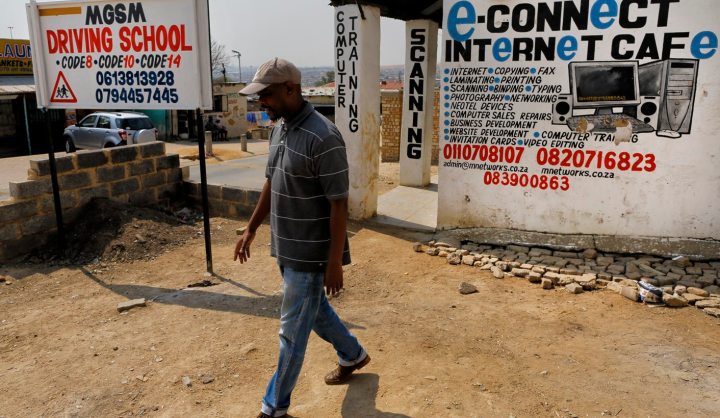Newsdeck, South Africa
Op-Ed: State failed to deliver on connecting the majority

Nothing illustrates better the paucity of the ANC’s developmental state philosophy than the failure of the South Africa Connect broadband roll-out plan to connect 50% of the population to the internet by 2016 and 90% by 2020. By MARIAN SHINN.
According to World Wide Worx, 40% of South Africa’s population will be able to connect to the internet this year. Most of these connections are mobile and urban.
What has crippled SA Connect – energetically driven by former Communications Minister, Yunus Carrim, through extensive nationwide public participation processes to Cabinet approval in November 2013 – is the ANC’s myopic belief that it has to be seen to be the deliverer.
“It” in this case means entities of the state.
In the mistaken belief that Telkom was a State-Owned Company (SOC), President Jacob Zuma announced in the 2015 State of the Nation address that it would be designated to be the lead agency responsible for rolling out the first phase of the multi-billion rand project.
The Minister of Telecommunications and Postal Services, Dr Siyanbonga Cwele, told me that he hoped that, in return for all the business, Telkom would be willing to roll out SA Connect at bargain basement prices.
He then busied himself being much photographed taking tea with local notables in the eight pilot rural sites, no doubt promising them rapid inclusion and economic benefits from SA Connect’s doorway into the World Wide Web.
But on the hotly contested ground that is South Africa’s Information Communications Technology (ICT) sector, there was outcry about the illegality of handing out SA Connect to Telkom, and insistence on compliance with the Public Finance Management Act (PFMA) that requires a public tender process.
After some time, the Department of Telecommunications and Postal Services (DTPS) applied to the National Treasury for a waiver on the PFMA tender process so it could award the work to Telkom. National Treasury refused the request.
On 24 June 2016, a tender was unexpectedly published by the State Information Technology Agency (Sita) to specifications given to it by DTPS. It was blatantly obvious to the sector that no one but Telkom stood a chance to win it.
Six companies submitted bids. Telkom declined to do so. The tender was cancelled on 18 November 2016 because none of the bidders “met the specifications”.
When DTPS appeared before the Parliamentary Portfolio Committee earlier this year to belatedly explain the failure of the tender, I asked whether they had engaged at all with the unsuccessful bidders and Telkom, about how to revise the roll-out plan to incorporate their suggested solutions.
Obviously these firms had invested considerable time into composing solutions that would best deliver to the SA Connect sites so there must be some worthwhile suggestions in their bid documents. My question was met with looks of incomprehension by the officials. It was clear the idea had not occurred to them.
Telkom, when it decided not to bid, offered to meet with DTPS to share its ideas on how best to deliver SA Connect. They were met with silence.
So here we are, a year after the tender was cancelled, cobbling together an SA Connect delivery mechanism comprising firstly, the forced marriage of DTPS’s SOCs Sentech and Broadband Infraco into a new SOC to spearhead the project, then calling in the crippled cousins Prasa, Eskom, Transnet and Sanral to share their communications infrastructure and then, finally, forming agreements with the profitable and agile private sector to share their networks.
Much of this is being informed by the policy requirement to “rationalise” SOCs in the mistaken belief that, instead of closing them down or selling their assets to private sector players best able to leverage them for the public good, a strategy of tortuous mergers, turf wars and frantic forays into taxpayers’ wallets is the best strategy as they scrabble for up to R60-billion to link about 42,000 government sites to the internet.
DTPS’ funding solution is for participants in SA Connect to get loans from the Development Finance Institutions (DFIs) such as the Industrial Development Corporation and Development Bank of Southern Africa as well as BRICS’ members, such as China at whom Minister Cwele is often shaking his tin.
This is the ANC’s developmental state’s answer to rapidly bridge the digital divide between the, largely, rural poor and the urban elite that is connected to the wide world of opportunities, services and products.
It will deliver a ticking time bomb of impoverished, angry people.
There is a simpler solution:
- Sell Broadband Infraco’s 14 661km fibre network to the private sector;
- Privatise Sentech – whose balance sheet is being rapidly eroded by inclusion by the failed Broadcasting Digital Migration programme – so it can pursue its ambition to be a profitable continental signal distributor;
- Auction desperately needed spectrum to unblock the airwaves to deliver mobile internet access throughout the country and generate about R30 billion – or more – to help fund SA Connect’s roll-out;
- Structure the SA Connect strategy into provincial or regional areas, each with its own co-ordinating agency that could either be the provincial government or private-sector project managers;
- Ensure that DTPS’ SA Connect office is staffed by suitably qualified electronic engineers and project managers to act as an effective oversight body to drive quality, delivery to deadlines and adherence to standards;
- Develop a provincial tender, or tenders, to deliver robust, scalable, open access networks built on the most appropriate technology for the area;
- Design the tenders to be inclusive of local network service providers and SMEs to boost economic growth in towns and rural areas;
- Ensure that the Independent Communications Authority of South Africa (Icasa), independent of government and private sector influence, is appropriately resourced and financed to deliver on its mandate to promote competition and quality service in the sector, and enthusiastically driving infrastructure sharing and facilities leasing regulations (that already exist);
- Fast track the implementation of the rapid deployment guidelines to instil consistency of regulations and processes at all spheres of government and to reduce red tape that hinders ICT infrastructure build;
- Incentivise the private sector to deliver to under-serviced, mainly rural, areas; and
- Develop incentive programmes to encourage local and foreign investment in the ICT sector.
South Africa has a wealth of innovative talent in the ICT sector – particularly in software and content development such as online gaming and financial services. Much of this is competitive internationally which could bring in much needed foreign currency.
There is a commitment by most South Africans to make our nation work to deliver a prosperous democracy for all who chose to live here. But increasing frustration with policy uncertainty in the sector and the heavy hand of bureaucracy fails to set the sector free to prosper which is likely to prompt our most talented innovators to lodge their intellectual property – and much of its income – in friendlier ICT regimes outside South Africa.
To keep these ideas, skills and investments for our home-ground advantage we need to be agile and imaginative in providing the infrastructural environment that will help it flourish. And the developmental state model cannot deliver that. DM
Marian Shinn MP is DA Shadow Minister of Telecommunications and Postal Services.
Photo: A view of a small internet business with hand painted advertising in Alexandra Township, Johannesburg, South Africa, 26 August 2015. Many small businesses in the townships of the city are adorned with hand painted advertising. Most fashionable and colour are the hair salons. Sign writers are paid per shop including paint and time spent painting. EPA/KIM LUDBROOK




















 Become an Insider
Become an Insider